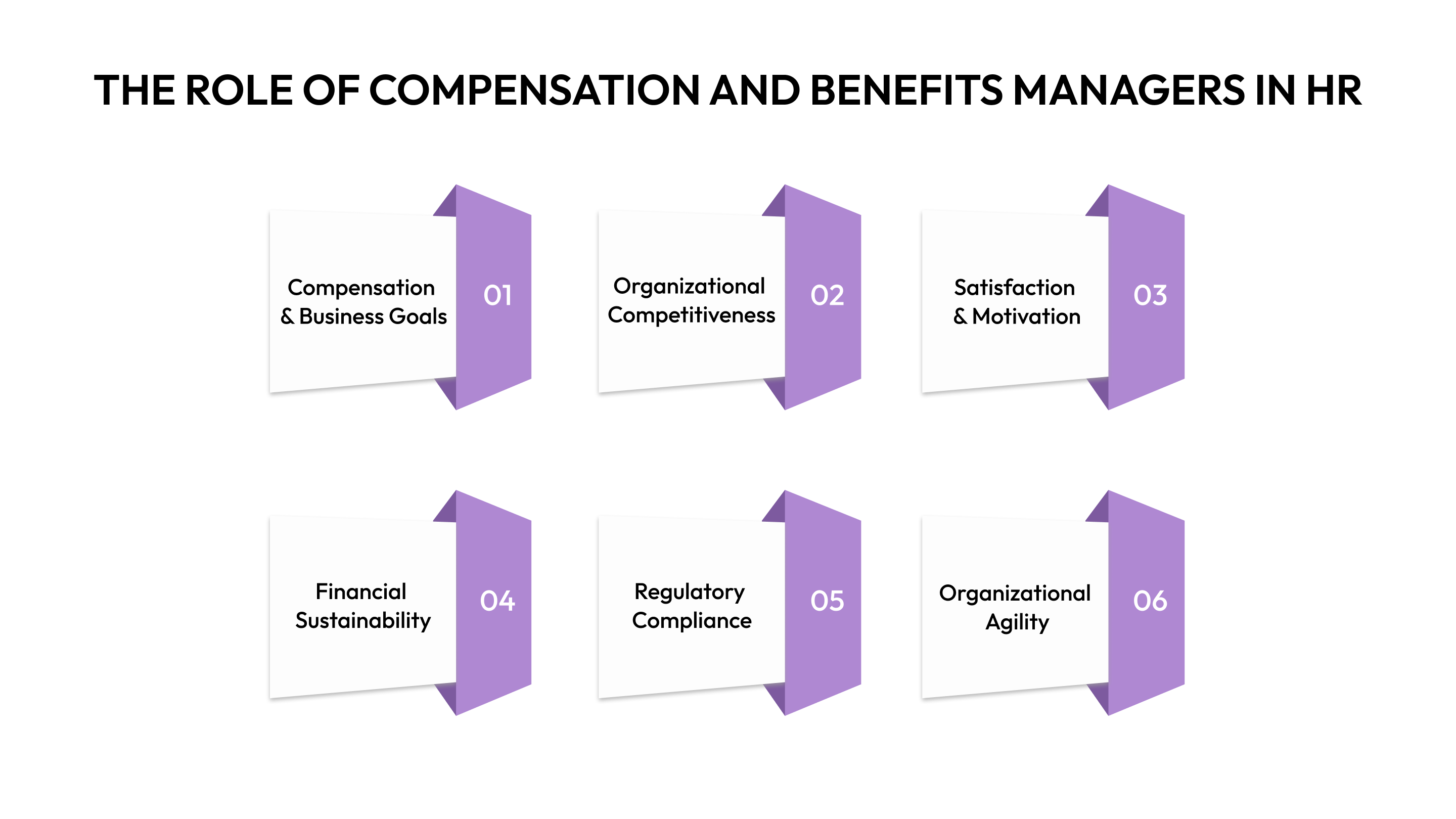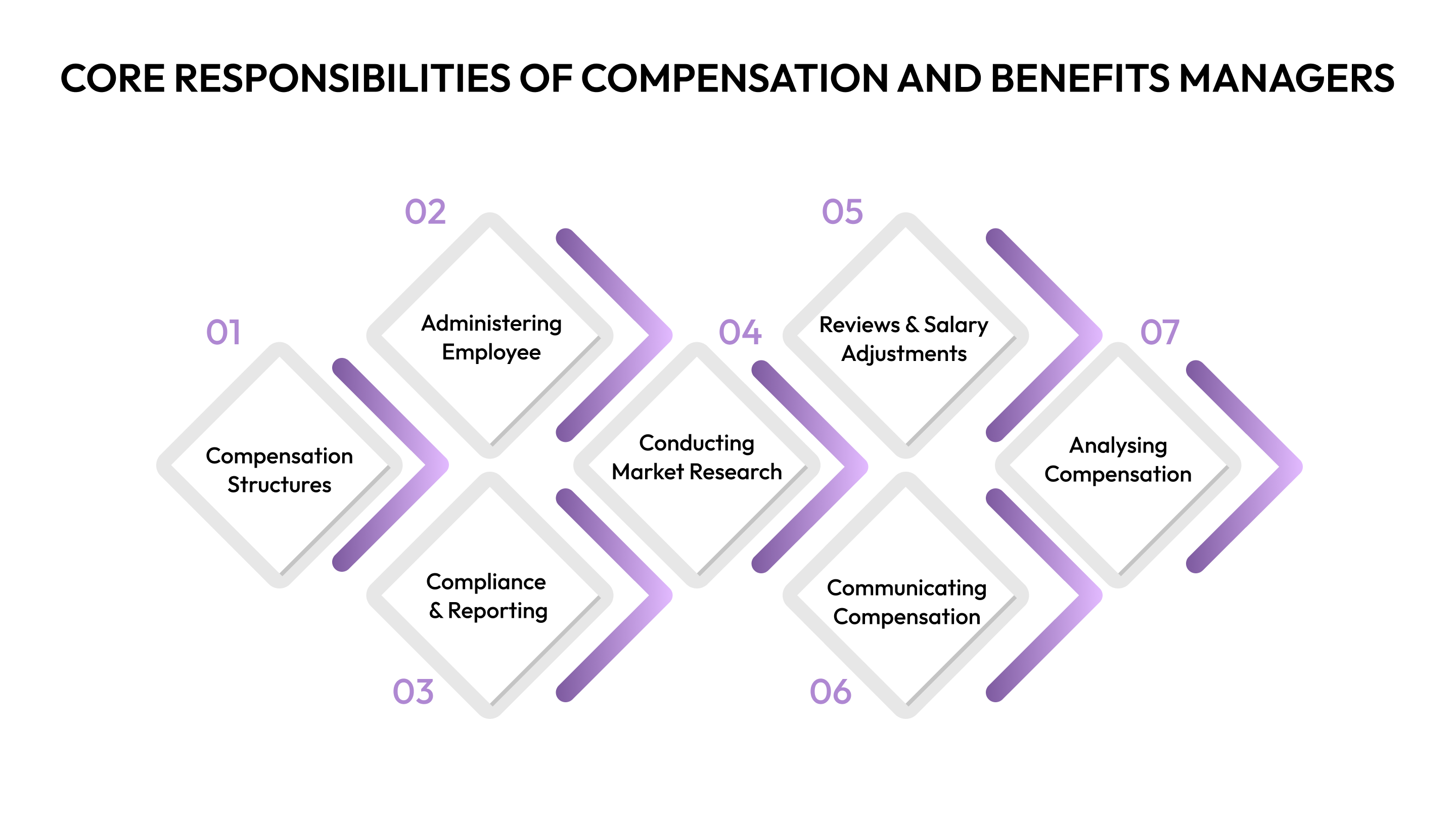Understanding the Role of Compensation and Benefits Managers
Discover what compensation and benefits managers do. Learn key tasks like salary benchmarking and managing benefits. Explore career prospects and skills needed. Click to dive in!

Compensation and benefits managers play a pivotal role in shaping the way organizations reward and engage their employees. In 2024, a significant number of organizations grapple with the challenge of designing compensation strategies that are both competitive and sustainable.
According to PwC's Global Workforce Hopes and Fears Survey, nearly two-thirds of employees report experiencing more change at work in the past year than in the preceding 12 months, with many expressing concerns about the reasons for these changes. This highlights the complexities faced by compensation and benefits managers in aligning pay structures with evolving organizational goals and market conditions.
As businesses face evolving workforce dynamics, from remote work policies to the growing demand for benefits beyond just health insurance, compensation and benefits managers are tasked with aligning company goals with employee satisfaction.
In this blog, we’ll explore what it means to be a compensation and benefits manager, the skills required, and how these professionals drive organizational success.
Key Takeaways
- Compensation and benefits managers are responsible for designing, implementing, and managing employee compensation strategies and benefits programs.
- Their role ensures that compensation structures are aligned with business goals, remain competitive, and promote employee satisfaction.
- Legal compliance and market research are crucial parts of their responsibilities to avoid legal risks and ensure their pay and benefits offerings are up to date.
- Effective communication and negotiation skills are essential for explaining compensation packages to employees and aligning strategies with leadership.
- These managers also play a key role in retaining talent by ensuring pay equity and transparency across the organization.
The Role of Compensation and Benefits Managers in HR

Compensation and benefits managers play a crucial role in creating a balanced and productive work environment where employees feel valued, and the organization can sustain long-term growth.
They act as architects of the company’s overall compensation strategy, ensuring that it aligns with the broader business objectives. Their work helps foster a culture of fairness, equity, and transparency, which is essential for employee retention and engagement.
Here's how they do that:
- Driving Strategic Alignment Between Compensation and Business Goals: Compensation and benefits managers ensure that compensation structures reflect company objectives, aligning talent acquisition and retention with broader organizational goals. By linking compensation with business performance, they drive measurable value for the company.
- Strengthening Organizational Competitiveness: These managers ensure that compensation packages are competitive within the market, positioning the company as an employer of choice. Their work ensures that the organization’s pay structures remain appealing to top talent, keeping it ahead in the competitive job market.
- Influencing Employee Satisfaction and Motivation: Beyond pay, compensation, and benefits, managers have a direct impact on employee satisfaction. By ensuring that compensation practices are fair, transparent, and aligned with employee expectations, they create a workplace where employees feel valued and motivated.
- Ensuring Cost-Effectiveness and Financial Sustainability: While creating competitive pay and benefits packages, these managers also balance the organization’s financial objectives. They strategically manage compensation budgets, ensuring that reward programs are not only attractive but also sustainable and aligned with financial goals.
- Maintaining Regulatory Compliance: Compensation and benefits managers play a critical role in navigating complex labor laws and tax regulations. They ensure that compensation programs comply with all federal, state, and local regulations, mitigating the risk of costly penalties and lawsuits.
- Enhancing Organizational Agility: By regularly monitoring compensation trends and workforce needs, compensation and benefits managers enable organizations to respond to shifts in the market quickly. Their ability to adapt compensation structures in real time supports organizational agility and ensures long-term success.
Suggested read: Creating an Effective Employee Compensation Plan
With a clearer understanding of their role, let’s explore the core responsibilities these professionals carry out on a day-to-day basis to achieve organizational goals.
Core Responsibilities of Compensation and Benefits Managers

Compensation and benefits managers are crucial in shaping how a company attracts, rewards, and retains talent. They are responsible for overseeing all aspects of employee compensation, including salaries, bonuses, benefits packages, and compliance with regulations.
Their role involves not just managing existing programs but also continuously improving them to meet organizational and employee needs.
What do compensation and benefits managers do:
1. Designing and Managing Compensation Structures
Compensation managers work with leadership to define pay structures that align with company strategy, budget, and market trends. They ensure that the organization remains competitive in attracting talent while maintaining internal equity.
Daily Tasks:
- Review and update pay bands based on market research.
- Collaborate with leadership to adjust compensation packages based on business objectives.
- Perform regular audits of the pay structure to ensure fairness and equity.
- Use compensation data to recommend salary adjustments and bonuses.
2. Administering Employee Benefits Programs
Benefits managers are responsible for overseeing the company’s benefits offerings, such as healthcare, retirement plans, life insurance, and wellness programs. They ensure that the programs are cost-effective and attractive to employees.
Daily Tasks:
- Coordinate with benefits providers to manage and negotiate health insurance, retirement plans, and other employee benefits.
- Communicate with employees about available benefits and how to enroll or make changes.
- Ensure that benefits packages comply with local, state, and federal regulations.
- Analyse the utilisation of benefits programs and make adjustments as needed to improve efficiency or satisfaction.
3. Ensuring Legal Compliance and Reporting
Compensation and benefits managers ensure that the company’s pay practices comply with all relevant labor laws, tax regulations, and employment standards. This includes maintaining up-to-date records, filing necessary reports, and staying informed about regulatory changes.
Daily Tasks:
- Monitor compliance with labor laws, tax regulations, and health & safety standards.
- Prepare and submit required reports, such as IRS filings or EEO reports.
- Review new laws or changes in regulations that affect compensation and benefits.
- Work with legal advisors to ensure all compensation policies are legally sound.
4. Conducting Market Research and Benchmarking
Staying competitive in the labor market requires continuous monitoring of compensation trends. Compensation and benefits managers regularly conduct market research to ensure their company’s pay and benefits offerings remain competitive with industry standards.
Daily Tasks:
- Analyse industry salary surveys to ensure pay structures are competitive.
- Benchmark the company’s compensation packages against competitors in the industry.
- Adjust pay scales and benefits offerings to reflect trends in the labor market.
- Provide recommendations to leadership for adjustments based on market changes.
5. Managing Performance Reviews and Salary Adjustments
One of the key responsibilities of compensation managers is managing performance evaluation processes that impact salary adjustments, bonuses, and promotions. They ensure that performance reviews are tied to compensation outcomes in a fair and transparent manner.
Daily Tasks:
- Set up and maintain the performance review system, including merit-based pay increases and bonus structures.
- Work with managers to ensure reviews are completed on time and accurately reflect employee performance.
- Track performance metrics to ensure that compensation adjustments are based on performance.
- Handle salary increase requests and negotiate adjustments based on performance data.
6. Communicating Compensation and Benefits Information
Effective communication is key to ensuring employees understand their compensation and benefits packages. Compensation and benefits managers play a critical role in educating employees about the value of their total compensation.
Daily Tasks:
- Provide employees with clear, accessible information about their compensation and benefits options.
- Host informational sessions or workshops to explain new benefits or compensation changes.
- Respond to employee inquiries about pay, benefits, and eligibility.
- Ensure that compensation statements and benefit documents are accurate and distributed on time.
7. Analysing Compensation Data and Reporting
Compensation and benefits managers use data to assess the effectiveness of their programs and recommend improvements. They analyse trends and prepare reports for senior management to support decision-making.
Daily Tasks:
- Collect and analyse compensation data, such as salary levels, benefits usage, and employee turnover.
- Prepare reports for HR leadership on the performance and effectiveness of compensation and benefits programs.
- Use data analytics tools to identify trends in compensation and benefits that may require adjustments.
- Present findings to senior leadership to support business decisions related to compensation strategies.
Also read: Incorporating Forecast Accuracy in Financial Compensation Planning
As we understand the key responsibilities, let’s now look at the skills and qualifications that pave the way to becoming a successful compensation and benefits manager.
How can one become a Compensation and Benefits Manager?

Becoming a Compensation and Benefits Manager presents its share of challenges, particularly in an ever-evolving job market with increasingly complex compensation systems. This role requires a deep understanding of compensation structures, benefits management, and legal regulations, as well as the ability to work closely with senior leadership and HR teams. The challenge is not only mastering these areas but also developing the strategic thinking to align compensation with broader organizational goals.
However, the right combination of qualifications, skills, and experience can set you on the path to becoming a successful compensation and benefits manager.
Below are the key skills required to succeed in this role and where each will be applied in everyday tasks.
1. Analytical Skills
Compensation and Benefits Managers must be able to analyse complex data and make informed decisions based on market trends, pay equity, and financial constraints.
Where it will be applied:
- Analysing compensation data to ensure internal equity and market competitiveness.
- Reviewing reports on compensation trends and adjusting pay scales accordingly.
- Creating cost-effective compensation plans based on data insights.
2. Knowledge of Labor Laws and Compliance
Understanding and applying relevant labor laws and regulations is essential in maintaining compliance with federal, state, and local laws.
Where it will be applied:
- Ensuring compensation programs adhere to laws like FLSA, ACA, and EEO regulations.
- Managing compensation audits and reporting requirements.
- Keeping up with changes in tax and labor laws to adjust compensation strategies.
3. Communication Skills
Clear communication is key to explaining compensation packages to employees and aligning leadership on compensation strategy.
Where it will be applied:
- Explaining complex pay structures and benefits packages to employees in simple terms.
- Collaborating with leadership to align compensation strategies with business goals.
- Addressing employee concerns regarding pay, bonuses, and benefits in a transparent manner.
4. Negotiation Skills
Negotiation skills are crucial when discussing compensation packages with vendors, employees, or external partners.
Where it will be applied:
- Negotiating benefits packages with insurance providers, retirement plan administrators, etc.
- Discussing compensation adjustments with leadership or key stakeholders.
- Handling salary negotiations with new hires or current employees during performance reviews.
5. Project Management Skills
Compensation and Benefits Managers often oversee various projects, such as annual merit reviews, compensation audits, and the implementation of new benefits programs.
Where it will be applied:
- Managing the annual compensation review and bonus process across departments.
- Coordinating the implementation of new compensation software or benefits programs.
- Leading cross-functional teams to ensure the timely execution of compensation initiatives.
6. Attention to Detail
Given the complexity of compensation systems, even small errors can have significant implications. Attention to detail is essential for accuracy in pay and benefits calculations.
Where it will be applied:
- Ensuring accuracy in pay band calculations, benefits eligibility, and compensation adjustments.
- Reviewing compensation data to prevent errors in payroll or benefit deductions.
- Tracking compliance documentation to avoid discrepancies and legal risks.
7. Strategic Thinking
Compensation and Benefits Managers must think strategically to align compensation programs with long-term organizational goals and budget considerations.
Where it will be applied:
- Developing compensation plans that align with company growth strategies and workforce planning.
- Identifying compensation trends and recommending adjustments to stay competitive in the market.
- Collaborating with leadership to design incentive structures that drive business performance.
8. Leadership and Team Collaboration
Strong leadership is necessary to lead initiatives and collaborate with various departments like HR, finance, and senior leadership.
Where it will be applied:
- Leading teams in charge of administering compensation and benefits programs.
- Collaborating with HR and finance teams to align compensation strategies with overall business goals.
- Providing guidance and training to HR teams on the implementation of compensation systems.
By acquiring these qualifications and honing these skills, you position yourself for success in the field, ensuring that you can meet the challenges and responsibilities of becoming a compensation and benefits manager.
Now that we've covered the key skills required, let's wrap things up by understanding how these professionals impact business success and contribute to growth.
Conclusion
The role of compensation and benefits managers extends far beyond just structuring pay or overseeing employee benefits. By aligning compensation programs with company goals, ensuring legal compliance, and keeping pace with market trends, these managers help retain top talent and drive business growth.
At CandorIQ, we understand the complexities of designing effective compensation strategies. Our platform empowers compensation and benefits managers to build competitive pay structures, ensure equity, and align workforce plans with business goals — all while maintaining transparency and compliance.

Book a demo today to see how CandorIQ can help streamline and optimise your compensation and benefits processes for a more strategic, data-driven approach.
FAQs
1. How does technology impact the role of compensation and benefits managers?
Technology plays a crucial role by automating tasks like data collection, compensation calculations, and compliance monitoring. Tools like HRIS, compensation management software, and analytics platforms enable managers to make more informed, data-driven decisions.
2. How do compensation and benefits managers handle compensation during periods of economic downturn?
During tough economic times, compensation and benefits managers must adjust pay structures and benefits programs to remain financially sustainable. They may prioritize essential benefits, freeze salary increases, or implement performance-based bonuses to control costs while keeping employee morale intact.
3. What role do compensation and benefits managers play in diversity, equity, and inclusion (DEI) initiatives?
Compensation and benefits managers ensure that compensation structures are equitable by addressing pay gaps related to gender, race, or other factors. They collaborate with HR and leadership teams to align compensation practices with DEI objectives, fostering fairness and inclusion across the organization.
4. How do compensation and benefits managers work with other departments like finance and legal?
Compensation and benefits managers collaborate with finance to align compensation strategies with the company’s budget and long-term goals.
5. How do compensation and benefits managers evaluate the effectiveness of benefits packages?
They regularly collect feedback from employees, track utilization rates, and compare offerings against industry benchmarks to assess whether benefits programs meet employee needs and remain competitive.


